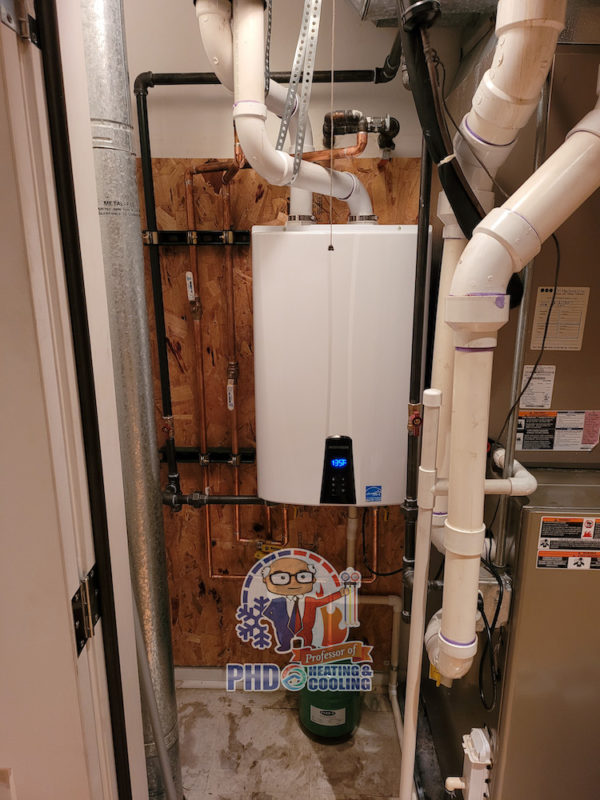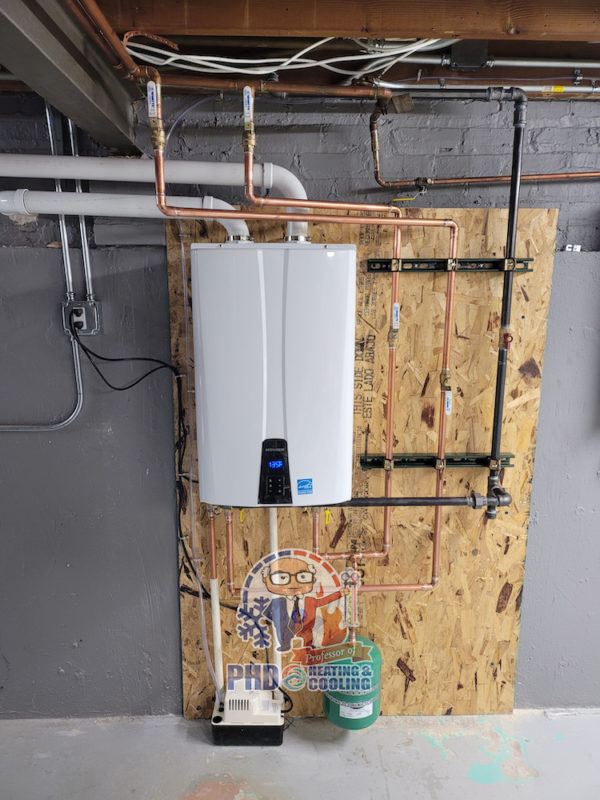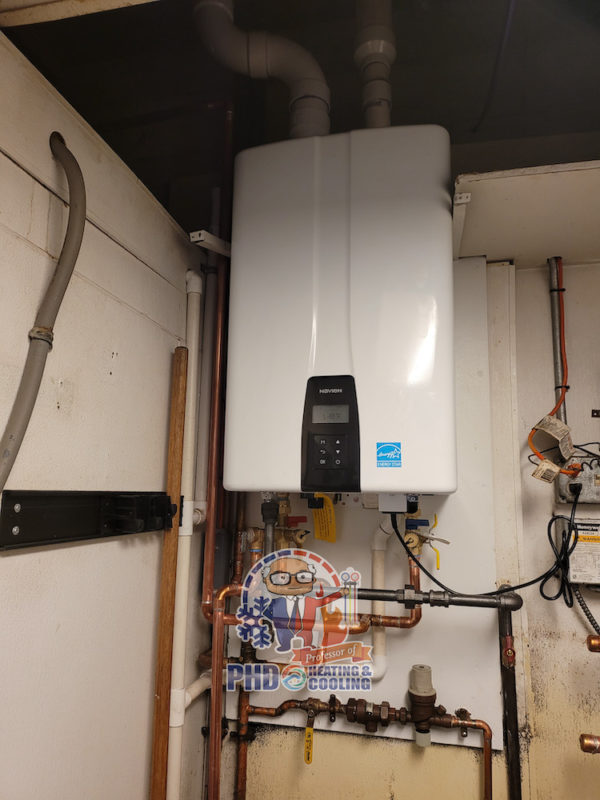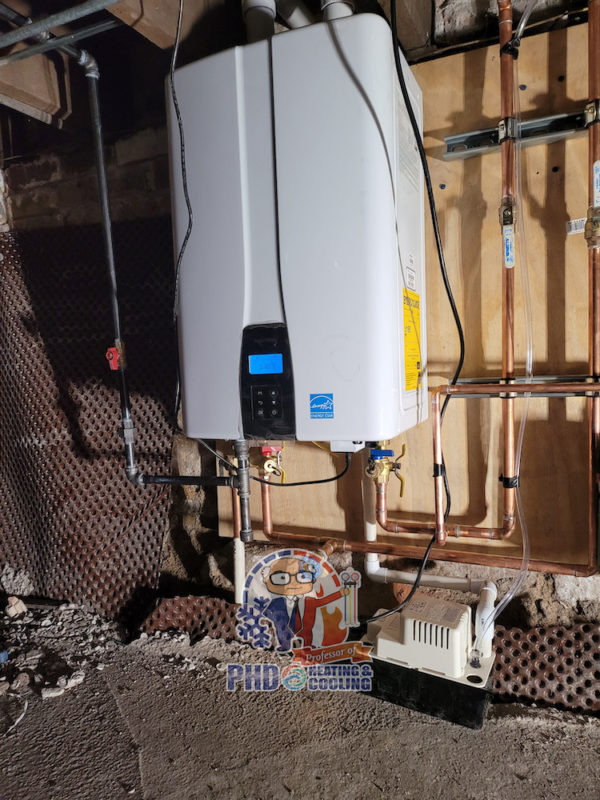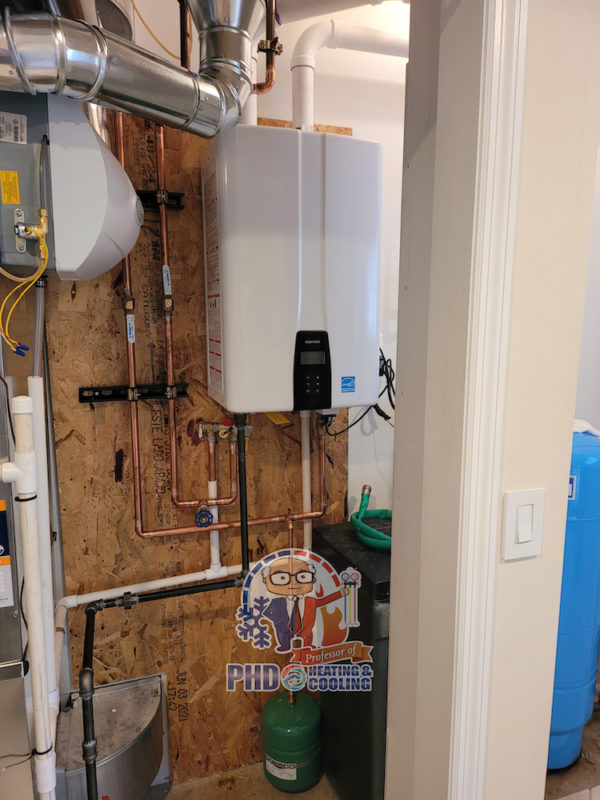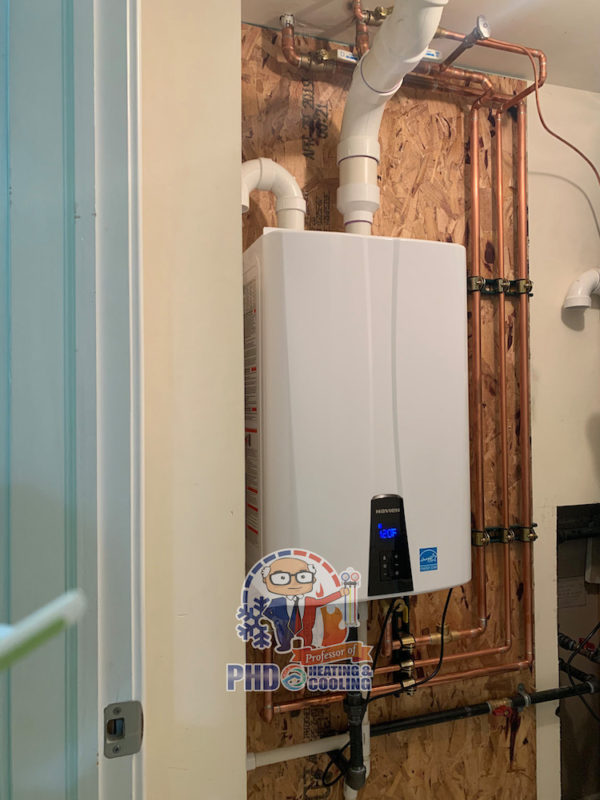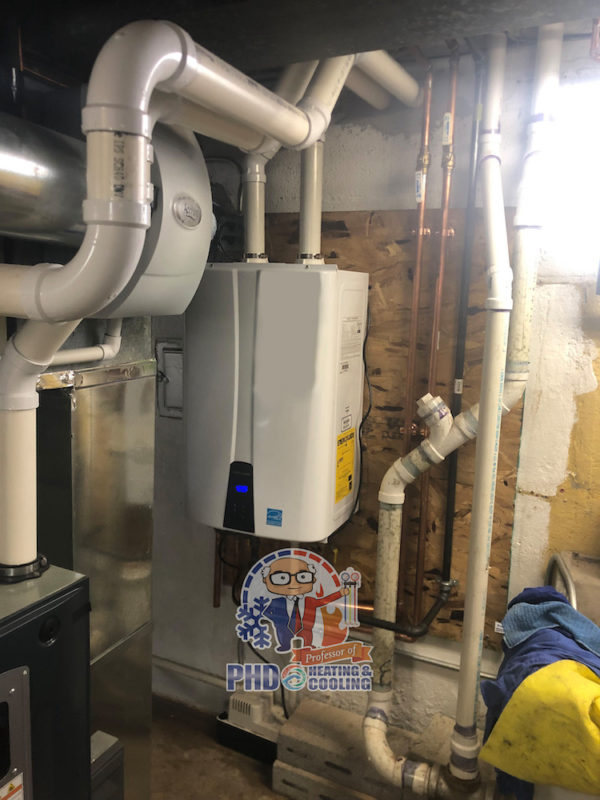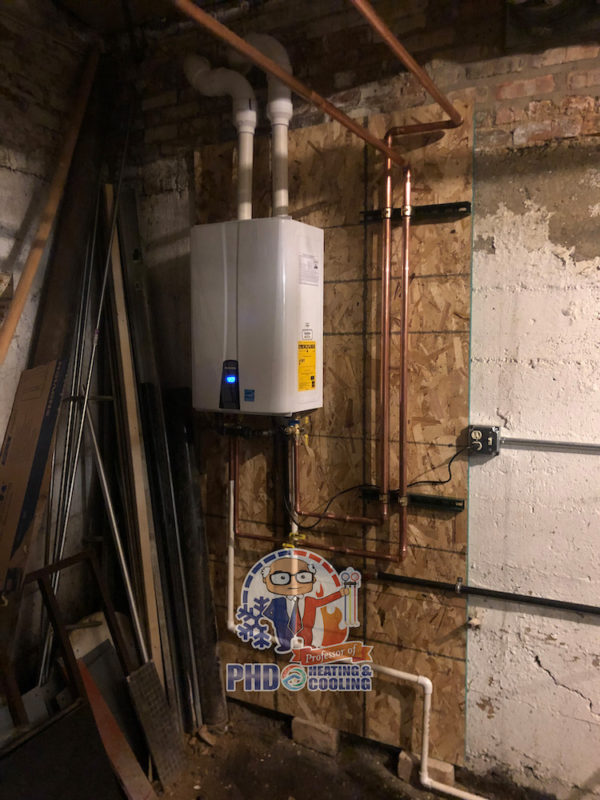A tankless, or on-demand, water heater only heats water when you need it. These heaters can be installed in a closet, on an exterior wall or another convenient place inside your home and can heat your whole home or a single point of use. With point of use, you can have a separate water heater designated for a shower, sink or appliance.
These water heaters give you an endless source of hot water, all while saving money on energy costs by not heating and reheating the same tank of water. While the initial purchase and setup is more expensive, most homeowners find, through the energy savings, the appliance pays for itself after a few years.
Since tankless water heaters don’t store heated water, these instant hot water heaters work like this:
- When opening a hot water tap, or starting the dishwasher, the tankless water heater recognizes the need for hot water and starts the heating process.
- The temperature of the incoming water is used to calculate how much heat the burners must produce to deliver water at the desired temperature. When the demand for hot water ceases, the unit shuts down and uses no energy, waiting until more hot water is needed.
- The end result: hot water that isn’t limited to what’s available in your tank.
Benefits of a Tankless Water Heater with PHD Heating & Cooling
Instant Hot Water
You can turn any water source into hot water on demand. You aren’t limited to the amount a storage tank heater can hold. Whether you’re washing the dishes, washing your clothes or drawing a hot bath, tankless water heater technology will supply endless hot water to your lifestyle demands, even if you do them all at once.
Lower Energy Bills
Take advantage of up to 40% energy savings with a tankless water heater. Units are designed to be highly efficient and only heat water when it’s needed.
Longevity
Tankless water heaters typically last up to 20 years, twice as long as a tank-style unit.
Space Savings
Traditional water heaters can take up to 16 square feet of valuable floor space. Tankless water heaters are about the size of a carry-on suitcase and can be installed on virtually any wall inside or outside of your home.
Clean, Fresh Water
Traditional water heaters can build up rust and scale inside the tank, where the hot water you use for bathing and drinking is stored. With tankless water heaters, you’ll always experience fresh, clean water that’s heated on demand as it passes through the unit.

A- 2″ PVC up to 75 feet and 1/2″ gas up to 24 feet
B – High efficiency up to 0.95 UEF and up to 15:1 TDR
C- Durable dual stainless steel heat exchangers
D – EZNav™ multi-line control with built-in intuitive software


Built-in recirculation system
Navien’s patented ComfortFlow® system is the first to include a buffer tank, recirculation pump and fine-tuned controls into a tankless water heater, resolving the cold-water sandwich effect* and issues of minimal flow rates commonly found in other tankless water heaters.

Multi-line control with built-in intuitive software
Navien’s new backlit EZNav™ control panel uses simple text and icons to make set up, operation status and troubleshooting faster and easier than ever before.
- Self-diagnostics.
- Displays temperature and water flow rate.
- Displays status of cascade operation.
- Convertible display from °F to °C.
- User Friendly Interface.
- Easy setup.

Optional Wi-Fi remote control system
NaviLink makes it easy to communicate with your Navien systems anywhere internet service is accessible. The NaviLink module attaches easily to any new or existing* Navien tankless water heater, combi‐boiler and boiler.
Call us today at (312) 409-33-26 or contact us online to schedule a visit with one of our specialist.
Most of us don't know our hot water heater is going bad until we get nothing but cold water out of the tap -- but things don't have to go that far if you're alert to the clues of a hot water heater that isn't working quite right. If you see these five signs, it's time to call to PHD Heating & Cooling for professional help.
1. Fluctuating water heat
"No hot water at all" may be a no-brainer, but fluctuating water temperature is just as much of a clue that something's wrong. It may mean that mineral deposits have built up around your water heater's heating elements or that the heating elements need to be repaired or replaced.
2. Low hot water pressure
Mineral deposits can do more than reduce the efficacy of your water heater's heating elements. They can also build up enough to block pipes, reducing the water pressure coming out of your water heater. There are a few other issues that can also cause reduced water pressure, including kinked distribution lines or poor design.
3. It leaks
This one seems obvious, right? But it won't be unless you visually inspect your water heater -- something most home owners don't do until the hot water's already out. Incorporate a quick scan for leaks into your monthly maintenance routine, along with checking the smoke detectors in your home.
4. Water that's "off"
Visible or a metallic taste in your water means corrosion somewhere along the lines. If both your hot water and cold water are rusty when they come out of the tap, the corrosion is probably somewhere in your pipes. If only the hot water is rusty, odds are good that the problem is inside your hot water heater. You need professional help -- soon -- to arrest the corrosion before it damages your hot water tank or even causes it to fail. You may also get cloudy water out of the faucet, or water that smells strange (but not necessarily metallic). That's probably mineral deposits at work again; only professional maintenance will help keep them from building up and damaging the inside of your water heater.
5. Unusual sounds
A little noise is natural from your water heater -- after all, it's a major appliance. But if you hear loud popping, banging or cracking sounds coming from it, it's time to call us. Most likely, mineral deposits have built up and caused the appliance to overheat as it works to keep the water hot. If the tank hasn't already started leaking, a flush and thorough cleaning may be enough to keep it working. Have you seen any of these five signs that it's time for a water heater repair?
Call us today at (312) 409-33-26 or contact us online to schedule a visit with one of our specialist.
Tankless Water Heater don’t require much maintenance, cleaning them once a year is going to expand the lifespan and reduce the risk for corrosion.
The goal of routine tankless maintenance is to prevent scale from building up inside the heat exchanger, keep filters, igniters, fans and burners clean, and check gas pressure, proper venting and system performance. Over time, we’ve found that the average household benefits the most from annual service plans. With proper maintenance your tankless water heater will be more efficient, more reliable, and have a significantly longer service life.
Your Manufacturer and Warranty Recommends Routine Maintenance
Control compartments, burners, and circulating air passageways of the appliance must be kept clean. Tankless manufacturers warranties require a licensed professional inspect your system annually. Running your system without maintenance will decrease efficiency and lifespan.
PHD Heating & Cooling will inspect and clean the entire system, fuel, water heating, ignition, fan and burner assembly, condensate drain, error code history review, and check for proper venting and exhaust.
Due to their reliability and large energy saving benefits tankless water heaters have become something of a standard in home hot water these days. But that’s not to say that they’re immune to coming across a few troubles. But the good news is that many of these troubles are possible enough to spot, and catching them early can mean a lot of saving in the frustration and cost departments:
Warm but not hot water.
Is the water you’re getting tepid or just not quite at the range you were looking for? This is a very common problem for new hot water heaters, and thankfully one that is handled. New tankless systems typically feature either a digital interface, or a crank or dial to adjust temperature.
Water heater shutting itself off.
This can actually be one of a few issues, but the most common of them is a problem with the tankless system’s filter being clogged or otherwise incapacitated. It’s job for a repair PHD Heating & Cooling professional, and should take little time to remedy.
Variable temperatures.
If the temperature in your hot water seems to fluctuate from good, to too hot, to too cold all in the span of a single shower or wash, then you’ve got a problem. And it’s probably an electrical one. Loose connections are the most common cause of this obnoxious issue.
Electrical issues in the home.
This one ties into and often appears in conjunction with the above problem. Newer hot water heaters or older ones that have loose connections can create frequent and sudden power surges, which can cause lights to flicker, and even breaker trips.
Strange taste or color in your water.
Because a tankless unit lacks a reservoir for sediment to form in you should absolutely never deal with discoloration or funny tastes in your water. The issue could be with the water heater itself (broken down, defective) or could be with your actual water supply. Either way, contact us right away, because you don’t want this one sticking around.
Call us today at (312) 409-33-26 or contact us online to schedule a visit with one of our specialist.
Schedule service / Get my free quote
Fast, reliable, and quality results. Contact us for a free quote today.

